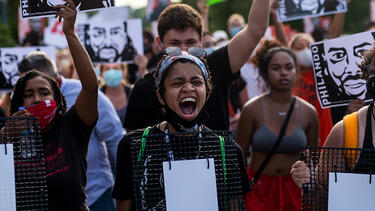What Allies Should Know about Interracial Communication
According to a Pew survey, 5% of White Americans say they have participated in protests since the murder of George Floyd, but many more—70%—say that the Black Lives Matter movement has prompted them to have conversations about race. We asked Yale SOM’s Cydney Dupree, who has studied how people from different racial groups communicate with each other, what her research says about the dynamics of the current moment.

Demonstrators march in St. Anthony, Minnesota, on July 6, 2020, the fourth anniversary of the murder of Philando Castile. Photo: Stephen Maturen/Getty Images.
What are the obstacles when it comes to interracial communication?
Interracial interactions can be plagued by anxiety, tension, and discomfort. Stereotypes play a role. Research suggests that White people worry about being stereotyped as cold or bigoted, while Black people worry about being stereotyped as incompetent. People can end up being so concerned about confirming stereotypes that they avoid interracial communication altogether. That, or they experience anxiety during the interaction, which other people pick up on.
What does your research say about the current dialogue between Black activists and White allies?
My work doesn’t speak to protest movements specifically, but it does suggest that White allies should be a bigger part of the conversation about how to make mostly White organizations more inclusive. My research finds that White liberals—who are typically more interested in being allies—present less competence when interacting with Black people than they do when interacting with other White people. We don’t yet know how this “competence downshift” is received by Black people, but if we think about Black peoples’ concerns about being stereotyped as incompetent, this may mean that White allies (perhaps unintentionally) contribute to interracial divides by being patronizing. This finding ultimately reinforces what a lot of people are now discovering—that being anti-racist is a complex task that requires a lot of learning, reflecting, and acting. It’s not for the faint of heart, but it’s necessary to create lasting change. Moments like these reveal the people and organizations that are willing to do the work, regardless of the complexity.
How can White allies be more effective in communicating with Black and White people in their networks about race?
White allies have to be willing to have difficult conversations in the first place, rather than staying silent or going to a protest and then calling it a day. It’s especially important for White allies to have conversations with White people in their networks, whether it is confronting racism from friends and family or simply expressing your views on social media. White people often freeze when confronted with racism—or they don’t immediately recognize it as racism—so read about the subtle ways racism now manifests in work and social settings, and consider ahead of time how you will respond when faced with it.
Regarding interactions with Black people, White allies should reflect before rushing to express empty statements of solidarity to their Black colleagues or friends. Are you asking a Black person to do free labor by requesting a book list or forcing a conversation during an emotionally trying time? Also consider motives: Are you asking Black people to absolve past transgressions or to reassure you of your allyship? When both parties are ready to discuss race, White allies must have the right expectations—not every conversation will be easy, comfortable, or immediately enlightening.
Finally, we must always remember that, while words and relationships matter, conversations alone will not change racism. Racism is a structural phenomenon, firmly embedded in our institutions and social structures; only concrete actions from organizations and policymakers can change it. White allies must put their money where their mouths are: on the hiring committees, in the voting booths, and at the protests.